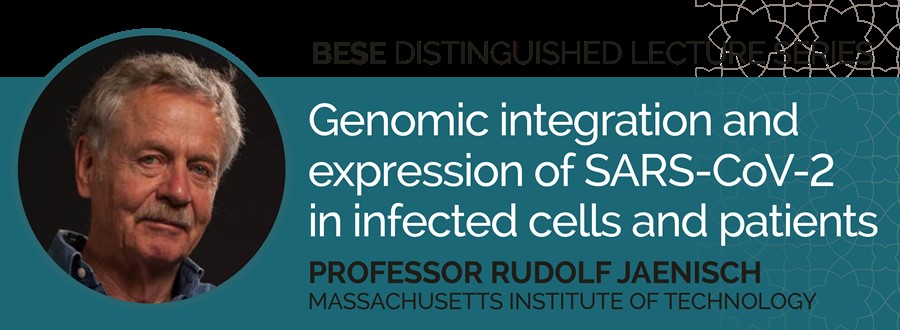
Monday, October 4
5:30 – 6:30 p.m.(AST)
On Zoom
Genomic Integration and Expression of SARS-CoV-2 in Infected Cells and Patients
By Professor Rudolf Jaenisch, Massachusetts Institute of Technology
Abstract
Prolonged SARS-CoV-2 RNA shedding and recurrence of PCR-positive tests have been widely reported in patients after recovery, yet these patients most commonly are non-infectious1-14. Here we investigated the possibility that SARS-CoV-2 RNAs can be reverse-transcribed and integrated into the human genome and that transcription of the integrated sequences might account for PCR-positive tests.
In support of this hypothesis, we found SARS-CoV-2 sequences integrated into the genome with a target site sequence duplication containing a consensus LINE1 endonuclease recognition sequence, suggesting that integration of viral sequences is mediated by a target primed reverse transcription and retroposition mechanism. Importantly, we also detected genomic viral sequences in the genome of patient derived tissues.
Finally, we present evidence that suggests that a large fraction if not most viral sequences found in some patient derived tissues are transcribed from integrated viral copies. Our data provide a novel insight into SARS-CoV-2 infection that may explain why patients can continue to produce viral RNA after recovery and suggests a new aspect of plus strand RNA virus replication.
About the speaker
Rudolf Jaenisch is a Founding Member of the Whitehead Institute for Biomedical Research and a professor of biology at the Massachusetts Institute of Technology. He is a pioneer in making transgenic mice, some of which have produced important advances in understanding cancer, neurological and connective tissue diseases, and developmental abnormalities and has explored basic questions such as the role of DNA modification, genomic imprinting and X chromosome inactivation. The laboratory is renowned for its expertise in cloning mice and in studying the myriad factors that contribute to the success and failure cellular reprogramming. More recently the lab has focused on using the iPS cell system to study diseases such as Alzheimer’s, Parkinson’s and Autism.
Dr. Jaenisch is a Member of the National Academy of Sciences and the International Society for Stem Cell Research. In 1996 he was honored with the Boehringer Mannheim Molecular Bioanalytics Prize, in 2001 was the recipient of the first ever Peter Gruber Foundation Award in Genetics, in 2002 won the Robert Koch Prize for Excellence in Scientific Achievement, the March of Dimes Prize in 2015 and in 2011 was a recipient of the United States National Medal of Science. In 2014 he was president of the ISSCR.

